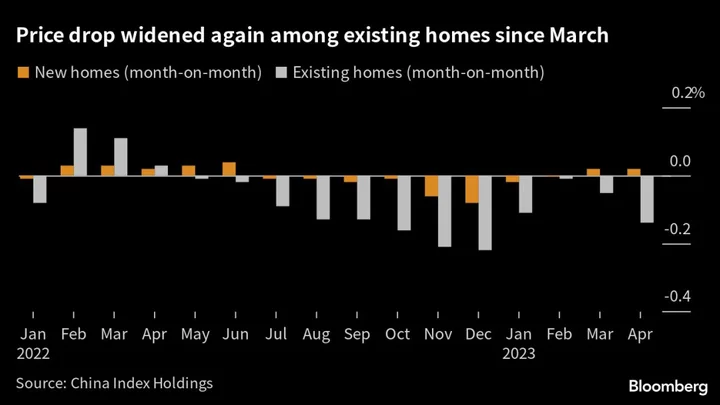China’s housing market sales is regressing after a brief recovery, underscoring the challenges the world’s second-largest economy is facing.
Signs of weakness are emerging after housing sales and prices recovered briefly following a historical slump of about 18 months. China’s property sector is key for the economic growth outlook this year, as it accounts for about 20% of the country’s gross domestic product after including related industries.
High-frequency indicators in recent weeks show momentum in home purchases has fizzled. Property investment also continues to contract, and consumers are reluctant to take out mortgages. That’s despite Beijing rolling out a slew of measures to prop up the market, from lowering home loan rates to easing financing rules for developers.
“After a short-lived recovery in February-March, the release of pent-up demand for home purchases has come to an end,” said Lu Ting, Nomura Holdings Inc.’s chief China economist. “The property recovery this year will be only moderate.”
The fate of the sector also weighs on the global economy, as it helps drive demand for commodities like iron ore and copper. After a bullish start to 2023, iron ore — used in steelmaking — has dropped below $100 a ton, largely because of the subdued demand for Chinese homebuilding.
Here are five warning signs from recent housing market data:
1. New Homes
Home sales were dismal over the five-day Labor Day break in May, the first long holiday since China abandoned pandemic restrictions and infection waves eased. New home purchases in 40 major cities tracked by data provider China Index Holdings were 22% below pre-pandemic levels in 2019.
Compared with last year, sales were up 25% — but that was mainly due to the low base of comparison with 2022, when Shanghai and other cities were in lockdown.
The four mega cities, which includes Shanghai and Shenzhen, showed a sustained recovery, with new residences sold rising 59% by area from pre-pandemic levels. In regional centers and smaller cities, sales plunged 28% and 42%, respectively.
That uneven recovery has damped investor sentiment in China’s high-yield dollar bond market dominated by developers’ notes. A Bloomberg index has erased an 11% gain from earlier this year to lose 5.4% year-to-date. A solid turnaround in investor sentiment would need more stabilization in property sales, said Cary Yeung, head of Greater China debt at Pictet Asset Management.
2. Existing Homes
In the existing-home market — which is less distorted by seasonal factors linked to the launch of developers’ projects — sales were even worse. In the first four days in May, second-hand residence sales plunged 44% by area from a month earlier, according to brokerage Zhongtai Securities, which tracks 15 major cities with active existing property sales. That compares with a 61% surge in February, when the market had showed signs of a turnaround for the first time.
The downturn is a worrying sign as analysts had hoped a sustained recovery in the existing-home market would eventually lift new-home sales, which have been less favored by home buyers in recent years because of delays in construction.
3. Unstable Prices
The decline in prices of existing homes started to widen again since March, reaching a four-month high in April, according to CIH data.
Pricing is less controlled by the government in this part of the market than in new homes. Among 100 cities tracked by CIH, existing-home values fell in 76.
New home prices were barely changed in April from the previous month. That said, new home prices could soon follow suit, as more cities saw a price decline.
4. Inventory Elevated
Slower property sales have led to a glut of inventory. Unsold houses have climbed 43% from a recent low in November 2021, around the time home prices began their downward spiral.
In 100 major cities, new-home inventory as of the end of March could take about 17.4 months to get sold, “still well above a reasonable level of 14 months,” according to estimates from Yan Yuejin, a research director at E-house China Research and Development Institute.
5. Mortgage Slump
The outstanding amount of individual mortgages had the smallest increase on record in the first quarter compared with a year ago, reflecting households’ reluctance to add debt. Demand for home loans is weak due to consumers’ pessimistic outlook for income growth, concerns about delays in new projects, and a shift in views about the long-term value of the sector.
Some homeowners have even chosen to repay mortgages early to take advantage of falling interest rates. Analysts at Everbright Securities Co. estimate the average monthly prepayment jumped 38% in the first quarter from the previous three months to around 300 billion yuan.
6. Real Estate Investment
Investment in real estate contracted at a faster pace in March than in the previous month, snapping an improving trend since the end of 2022. That suggests the rebound in home sales earlier this year has been insufficient to shore up confidence among developers, who have been scaling back land acquisitions.
The sluggish demand in construction can be seen in excavator sales in China, which plummeted 40.7% in April from a year earlier, according to data from the China Construction Machinery Association. XCMG Construction Machinery Co. expects the industry to decline by 5%-10% this year, with a recovery only expected in 2024, the Securities Times reported Thursday.
“We indeed see stabilization but at a weak level” this year for the housing market, Sonali Jain-Chandra, China mission chief for the International Monetary Fund, said Thursday in Beijing, adding real estate investment will still be a drag on growth this year.
--With assistance from Alice Huang, Tom Hancock and James Mayger.
(Updates with comment from IMF’s China mission chief)









